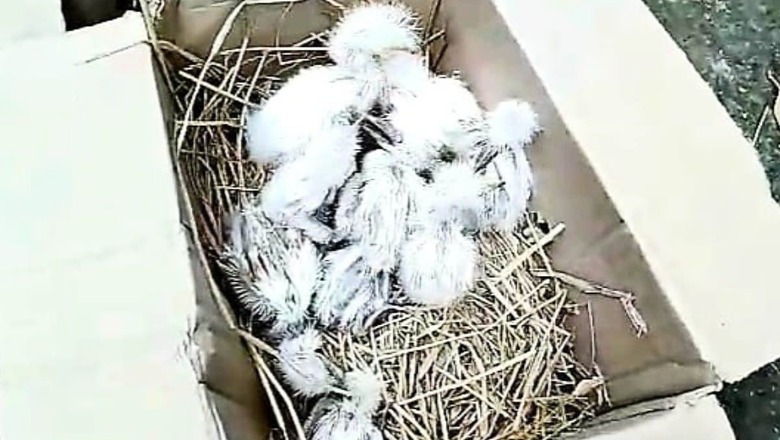
views
More than 250 cattle egret, including many hatchlings, were killed by the Tangla Municipal Board in Assam’s Udalguri district after a bizarre order based on claims that the birds spread coronavirus infections. The board had been feeling bamboo trees based on claims that the groove which nestled the egret colony for years were a source of Covid-19 due to the birds’ droppings.
The count was likely to go much higher had the District Deputy Commissioner P Uday Praveen not intervened and stopped the chopping down of bamboos on Thursday.
In an order dated June 8 signed by the executive officer of Tangla Municipal Board, five families of ward number 1 of Tangla town were informed that the egret birds’ dropping on their bamboo groves has “created an unhygienic environment” and have added to the risk of spreading coronavirus.” Therefore the bamboo groves in your area shall be felled to create a healthy living condition.”
The incident has sparked a row with several environmentalists flagging the “ridiculous” eviction order based on unfounded belief.
Environmentalist Jayanta Das termed the incident as “heinous and unfortunate” and said the Tangla civic body killed nearly 300 cattle egret.
“The odour of the dropping was a major objection for all. I would thank the DC of Udlaguri P Uday Praveen who intervened and stopped the further felling of the bamboo groves. Some birds were saved,” Das said.
The cutting of the bamboo grove which started on Thursday morning, was scheduled in four phases. The first phase itself was destructive enough to kill nearly 300 egrets, including many hatchlings. Around 60 egrets that survived were found by the villagers, who then raised the alarm.
Deputy Commissioner Parveen said arrangements are being made to send the birds to the Centre for Wildlife Rehabilitation and Conservation at Kaziranga in the next three days.
“All the birds shall be carried to the centre and efforts being made to ensure not a single bird died,” he said.
Cattle egrets are small-built herons protected under Schedule IV of the Wildlife (Protection) Act (1972). They are often seen alongside domestic grazing animals and feed on insects. Covid-19, the viral disease gripping the globe, is not bird-related. Researchers studying the origins of the virus believe the virus was transmitted from bats to humans. Still, this pandemic understandably provokes fear about wildlife diseases and so provides an opportunity to clear up confusion surrounding the question, “can birds get you sick?”
Karel Schat, professor emeritus of avian virology at Cornell University, saysminimalgenerally pose a “very limited threat to humans”. “If you want to admire the birds from afar in your backyard or your local park, you don’t have to worry about contagion. But if you are directly handling a bird or in contact with its excretions faecesas feces or saliva (that includes filling bird feeders),” he advises observing common hygiene practices, including not touching your face and washing your hands right after. “That’s because birds can carry some viral, bacterial, or fungal pathogens that cause human illness like Salmonella or West Nile virus.”
Somyadeep Dutta, President Natures Beckon said the Assam civic body’s move is condemnable as they could have waited for another 15-20 days so that the birds could have flown away. “Protection of environment and animals is our constitutional rights and this was unconstitutional,” Dutta said.
Dr Purnima Devi Burman, recipient of Green Oscar for her work in protecting the Greater Adjutant Stork, said incident like these is a setback to years of hard work in conservation efforts. “I have been working with the Adjutant storks. We organize Happy Hatching event or Panchamirit or Happy baby showers to involve people in the campaign to save these birds that lay nest in human surroundings, seeking our protection. These birds are farmers friends and are essential to maintain the Ecological balance. The reason for which the bamboo groves have been felled is totally unscientific and irrational. It’s a heinous act and is a criminal offence under Animal Protection Act 1972. How can a mother bear the sight of these just-hatched birds yearning for their mother?” she asks.
So painful to see them.These baby egret birds were falsely claimed to be a carrier of covid19 by Tangla Municipal board and their nests were destroyed.Can't help but imagine these voiceless babies are crying for their mothers on the the brink of their death.Let's raise voice. pic.twitter.com/IPajHfx24c— Purnima Devi Barman (@StorkSister) June 25, 2021
Dr Burman, along with 400 local female frontline workers, have been successfully educating people about the importance of the Greater Adjutant Stork. She founded the Hargila army, which rescues and conserves the birds. Around four hundred women are a part of the Hargila Army which works to conserve these birds. She believes the woman should be a part of the decision making process. Purnima Devi Burman is the Nari Shakti and Green Oscar Award recipient for her movement to protect the Greater Adjutanat Stork.
Pl enquire the matter @ParimalSuklaba1 https://t.co/AC2kQY2cZ9— Himanta Biswa Sarma (@himantabiswa) June 25, 2021
Assam Chief Minister Himanta Biswa Sarma has directed his environment and forest minister to look into the issue immediately.
Read all the Latest News, Breaking News and Coronavirus News here.



















Comments
0 comment